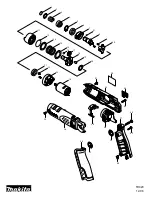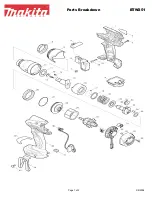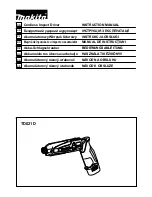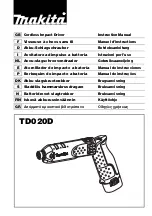
English
14
(5) Using optional parts (WR14DL2 / WR18DL2)
The tightening torque is reduced a little when an extension bar, universal
joint or a long socket is used.
(6) Clearance of the socket (WR14DL2 / WR18DL2)
A worn or deformed hex. or a square-holed socket will not give an adequate
tightness to the fitting between the nut or anvil, consequently resulting in
loss of tightening torque.
Using an improper socket which does not match to the bolt will result in an
insufficient tightening torque.
(7) Tightening torque varies, depending on the battery’s charge level.
MAINTENANCE AND INSPECTION
1.
Inspecting the driver bit (WH14DL2 / WH18DL2)
Using a broken bit or one with a worn out tip is dangerous because the bit
can slip. Replace it.
2.
Inspecting the socket (WR14DL2 / WR18DL2)
A worn or deformed hex. or a square-holed socket will not give an adequate
tightness to the fitting between the nut or anvil, consequently resulting in loss
of tightening torque. Pay attention to wear of a socket holes periodically, and
replace with a new one if needed.
3.
Inspecting the mounting screws
Regularly inspect all mounting screws and ensure that they are properly
tightened. Should any of the screws be loose, retighten them immediately.
Failure to do so may result in serious hazard.
4.
Maintenance of the motor
The motor unit winding is the very “heart” of the power tool.
Exercise due care to ensure the winding does not become damaged and/or
wet with oil or water.
5.
Inspecting the carbon brushes (Fig. 16)
The motor employs carbon brushes which are consumable parts. Since and
excessively worn carbon brush can result in motor trouble, replace the
carbon brush with new ones when it becomes worn to or near the “wear
limit”. In addition, always keep carbon brushes clean and ensure that they
slide freely whthin the brush holders.
NOTE
When replacing the carbon brush with a new one, be sure to use the Hitachi
Carbon Brush Code No. 999054.
6.
Replacing carbon brushes
Take out the carbon brush by first removing the brush cap and then hooking
the protrusion of the carbon brush with a slotted head screw driver, etc., as
shown in
Fig. 18
.
When installing the carbon brush, choose the direction so that the nail of the
carbon brush agrees with the contact portion outside the brush tube. Then
push it in with a finger as illustrated in
Fig. 19
. Lastly, install the brush cap.
CAUTION
Be absolutely sure to insert the nail of the carbon brush into the contact
portion outside the brush tube. (You can insert whichever one of the two
nails provided.)
Caution must be exercised since any error in this operation can result in the
deformed nail of the carbon brush and may cause motor trouble at an early
stage.
7.
Cleaning of the outside
When the impact driver is stained, wipe with a soft dry cloth or a cloth
moistened with soapy water. Do not use chloric solvents, gasoline or paint
thinner, as they melt plastics.
8.
Storage
Store the impact driver in a place in which the temperature is less than 40°C,
and out of reach of children.
NOTE
Make sure that the battery is fully charged when stored for a long period (3
months or more). The battery with smaller capacity may not be able to be
charged when used, if stored for a long period.
9.
Service parts list
A: Item No.
B: Code No.
C: No. Used
D: Remarks
CAUTION
Repair, modification and inspection of Hitachi Power Tools must be
carried out by a Hitachi Authorized Service Center.
This Parts List will be helpful if presented with the tool to the Hitachi
Authorized Service Center when requesting repair or other maintenance.
In the operation and maintenance of power tools, the safety regulations
and standards prescribed in each country must be observed.
MODIFICATIONS
Hitachi Power Tools are constantly being improved and modified to
incorporate the latest technological advancements.
Accordingly, some parts (i.e. code numbers and/or design) may be changed
without prior notice.
Important notice on the batteries for the Hitachi cordless power tools
Please always use one of our designated genuine batteries. We cannot
guarantee the safety and performance of our cordless power tool when
used with batteries other than these designated by us, or when the
battery is disassembled and modified (such as disassembly and
replacement of cells or other internal parts).
GUARANTEE
We guarantee Hitachi Power Tools in accordance with statutory/country specific
regulation. This guarantee does not cover defects or damage due to misuse,
abuse, or normal wear and tear. In case of complaint, please send the Power
Tool, undismantled, with the GUARANTEE CERTIFICATE found at the end of this
Handling instruction, to a Hitachi Authorized Service Center.
NOTE
Due to HITACHI’s continuing program of reserch and development, the
specifications herein are subject to change without prior notice.
Information concerning airborne noise and vibration
The measured values were determined according to EN60745 and declared in
accordance with ISO 4871.
Measured A-weighted sound power level: WH14DL2: 104 dB (A)
WH18DL2: 105 dB (A)
WR14DL2: 105 dB (A)
WR18DL2: 105 dB (A)
Measured A-weighted sound pressure level: WH14DL2: 93 dB (A)
WH18DL2: 94 dB (A)
WR14DL2: 94 dB (A)
WR18DL2: 94 dB (A)
Uncertainty KpA: 3 dB (A).
Wear hearing protection.
Vibration total values (triax vector sum) determined according to EN60745.
Impact tightening of fasteners of the maximum capacity of the tool:
Vibration emission value
a
h
= WH14DL2: 11.3 m/s
2
WH18DL2: 15.0 m/s
2
WR14DL2: 11.2 m/s
2
WR18DL2: 12.4 m/s
2
Uncertainty K = 1.5 m/s
2
01Eng_WH14DL2_EE
10/4/12, 3:43 PM
14
















































